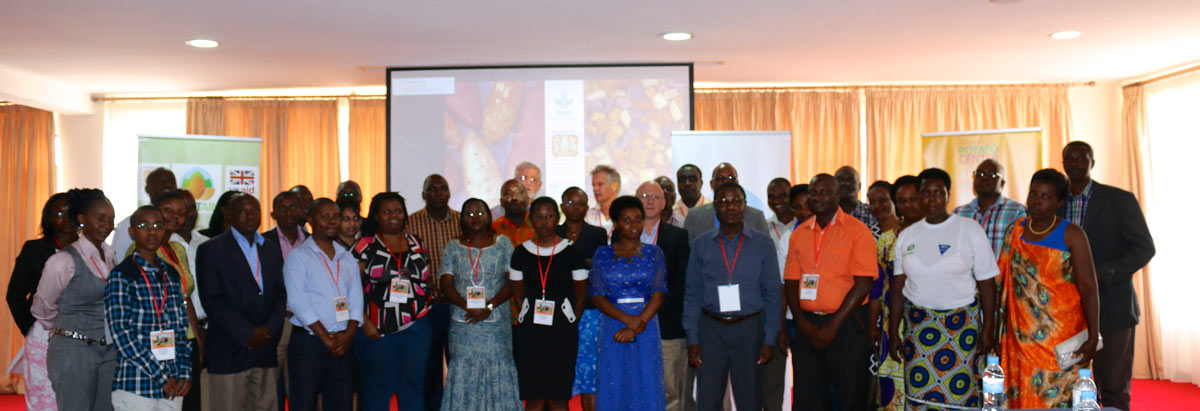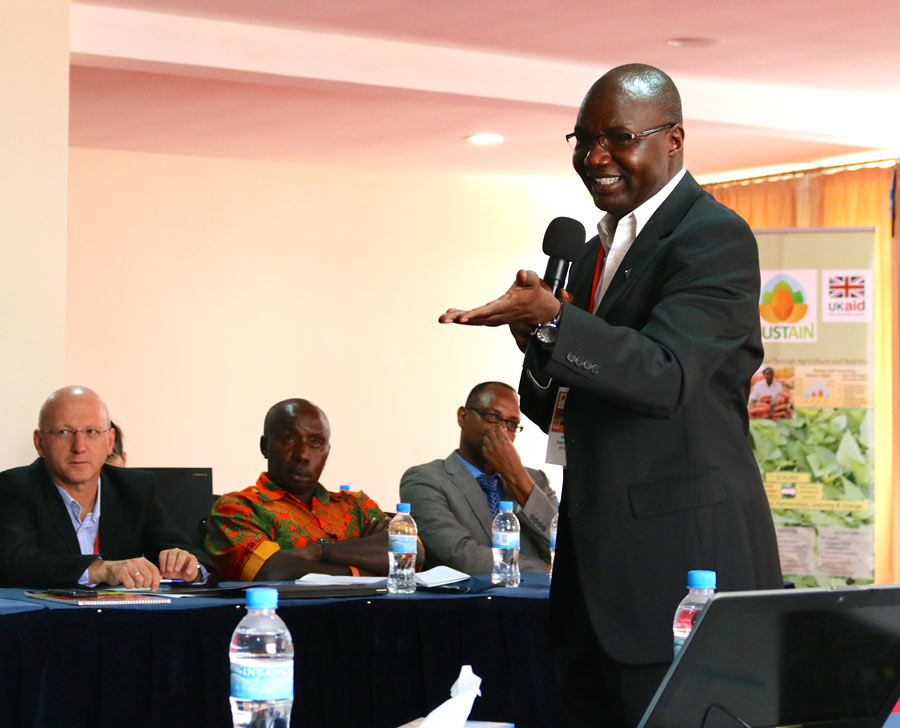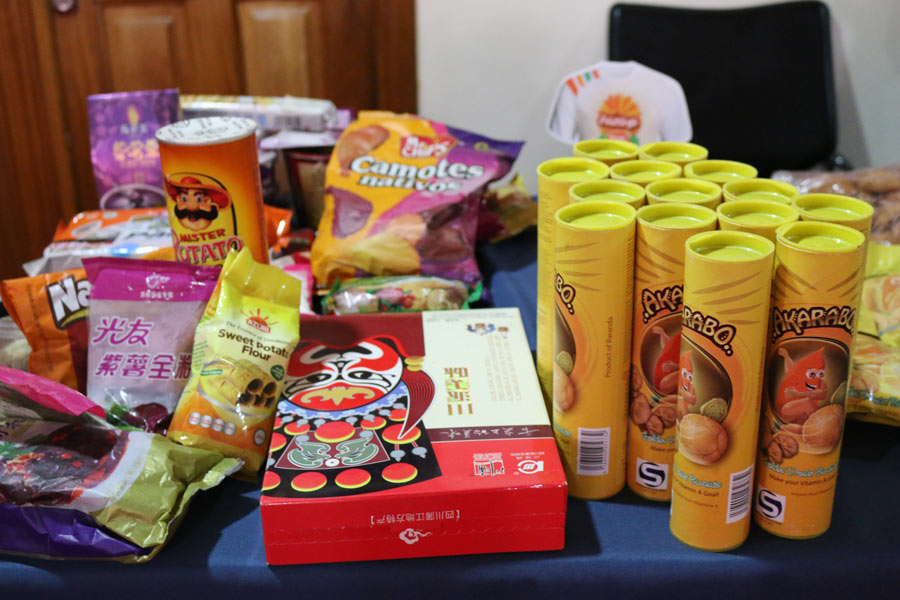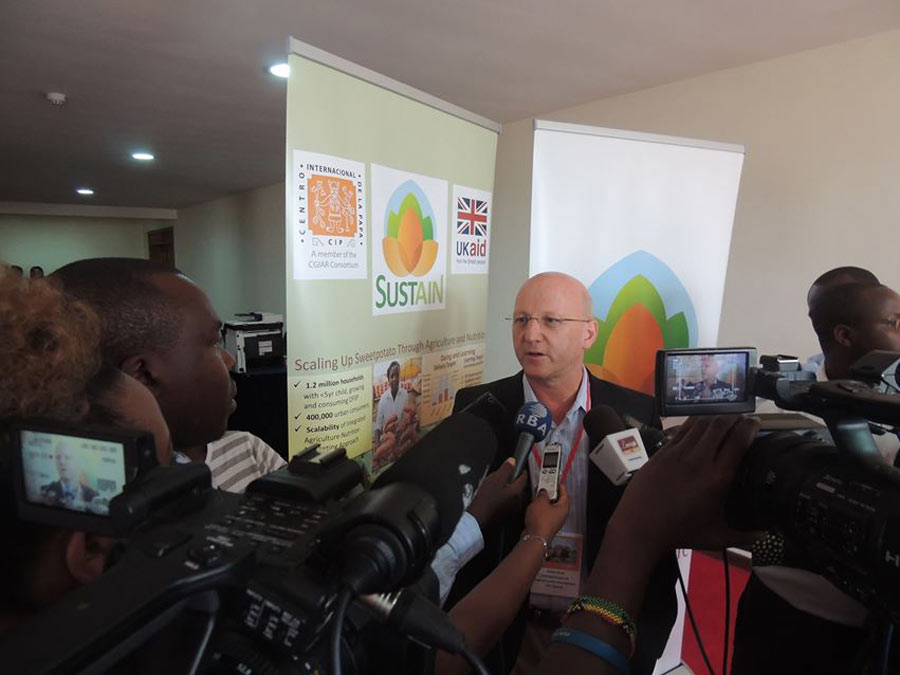An enthusiastic group of 45 people gathered together on March 10th to officially launch the Scaling up Sweetpotato through Agriculture and Nutrition (SUSTAIN) project in Rwanda’s capital of Kigali. Bio-fortified, vitamin A rich Orange Fleshed Sweetpotato (OFSP) varieties are an effective tool for reducing vitamin A deficiency (VAD) among children under five years of age, the group most at risk of VAD and bolstering livelihoods in Rwanda. VAD can lead to increased susceptibility to infections and blindness.
Over the next five years SUSTAIN aims to reach 1.2 million households with children under the age of 5 in Kenya, Malawi, Mozambique and Rwanda with integrated interventions in agriculture, nutrition, utilization and marketing to increase and strengthen OFSP consumption and production. The launch saw a range of NGO’s, private sector organizations, media and regional and district level agricultural experts come together to discuss SUSTAIN and the role of Orange Fleshed Sweetpotato in Rwanda and East Africa.

Attendees celebrating the launch of SUSTAIN Rwanda in Kigali on March 10 (Credit: S. Quinn/CIP)
The International Potato Center (CIP) managed project in Rwanda will scale up the development of an OFSP seed system, link beneficiaries to market through effective partnerships and integrate agriculture-nutrition health linkages to deliver OFSP to various segments of Rwandan households. By 2018 the project will reach an estimated 50,000 direct and 250,000 indirect Rwandan beneficiaries with young children with nutrition information and counseling in selected districts. Improved nutrition through dietary diversity and the increased OFSP consumption will also be emphasized at the household and community level.

Kirimi Sindi CIP Rwanda Country Manager engaging in a lively discussion with participants about OFSP and SUSTAIN in Rwanda (Credit: S. Quinn, CIP)
Dr. Jean Jacque Muhinda, Director General of the Rwanda Agricultural Board (RAB) a close collaborator with the SUSTAIN team officially launched the event. “In order to make a decisive impact on improving household and child nutrition, a comprehensive multi-sectorial policy and multi-partner action must be put into place,” he advised the attendees. “This is where a project like SUSTAIN can make a great contribution to the Rwanda society.” He went on to stress the importance of collaboration across sectors and stakeholders and gave project highlights on how SUSTAIN will meet its goals of helping farmers adopt new OFSP technologies; increase OFSP household consumption and encourage industrial diversified utilization of orange sweet potato.
Throughout the launch proceedings, Dr. Simon Heck SUSTAIN Project Leader and CIP Program Leader for Sweetpotato emphasized the importance of partnerships to the SUSTAIN program to achieve the programs ambitious goals of reaching 1.2 million households across 4 countries (Kenya, Malawi, Mozambique and Malawi) over the next 5 years. While a project officer from SUSTAIN funder UK Department for International Development spoke to the impact of investing in bio-fortified crops. “SUSTAIN Rwanda is taking place in the wider context of increased interest and investments in agriculture for nutrition and understanding what works. With a growing portfolio of bio-fortified crops being rolled out in Africa and South Asia, and strong evidence in efficacy of some of these new bio-fortified crops (including iron beans in Rwanda) there is now growing demand for robust evidence on impact of agricultural programs on nutrition.”

OFSP products on display at the launch of SUSTAIN Rwanda (Credit: S. Quinn/CIP)
Launch participants sampled an array of OFSP products being produced by Indyo Inoze, a cooperative from Muhanga District including: breads, cakes, and biscuits. OFSP is a cost-effective and vitamin A rich substitute to wheat flour and can be used to replace up to 43% of the more costly grain in manufactured products. This led to an animated discussion around issues of seed systems and nutrition.

Dr Simon Heck, Program Leader, Sweetpotato at CIP answer questions from the local media (Credit: S. Quinn, CIP & A. Ndayisenga, CIP)
Local media was also in attendance demonstrating interest in agriculture and nutrition projects in the Rwanda context. After the launch two major media outlets invited to participate in radio shows: Jean Claude Nshimiyimana, Seed Systems Officer and Aime Communications officer with CIP Rwanda discussed OFSP, SUSTAIN and CIP during a 30 minute radio talk show at CONTACT FM and Nshiminyimana and Jean Ndirigwe, Head of Sweetpotato Program at RAB (Rwanda Agricultural Board) were invited to participate in a coveted 8-10 a.m. Sunday morning radio slot on Radio Rwanda to discuss OFSP for 90 minutes. The shows highlighted the health and income generation of OFSP and encouraged listeners to sample new OFSP varieties. The live format included call in features where listeners could ask questions about OFSP, SUSTAIN and CIP.
The interviews were a great way to highlight our strong collaborations with partners in Rwanda and to discuss new opportunities on the horizon. Well done to the Rwanda team on fantastic media outreach!
A collection of media coverage from the event can be viewed here.
You can read more about the SUSTAIN project and CIP’s global Sweetpotato program here. See photos from the event on the CIP SSA Flickr site.
